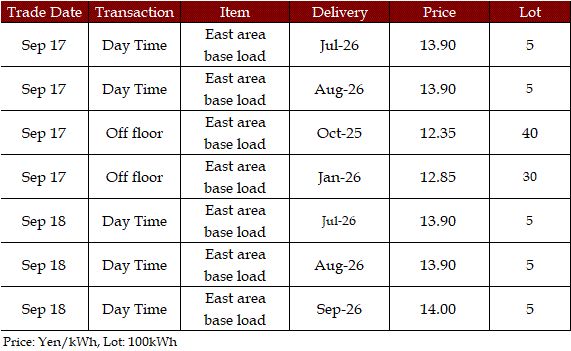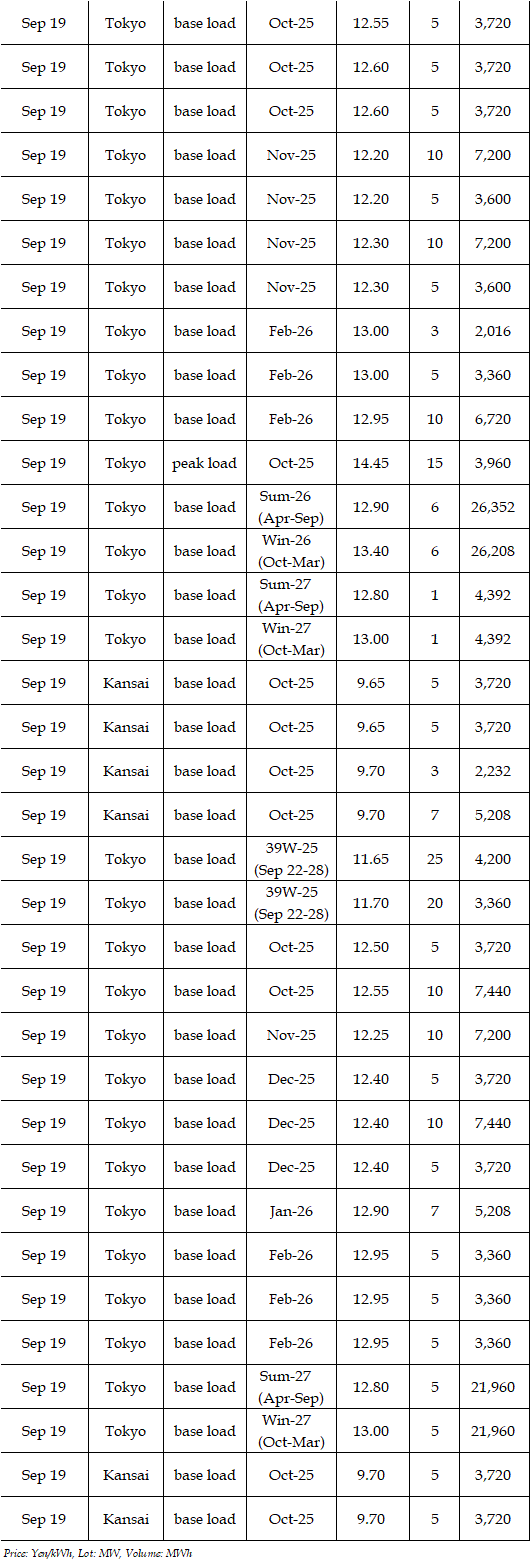Power: Sep 15-19: Spot price rebounds on persistent hot weather and small supply capacity
|
In the day-ahead market on JEPX (Japan Electric Power Exchange), the 24-hour spot power prices on a weekly average basis for Sep 15-19 delivery rebounded from the previous week in East Japan (50Hz) as well as in West Japan (60 Hz). Amid scorching weather, especially in and to the west of Kanto, as well as a strong demand for air conditioning, an increase in maintenance at thermal power plants tightened fundamentals, affecting prices. On Sep 17,in response to the tightened supply/demand balance in Kansai area, up to 820,000kw power sharing was conducted from Chubu to Kansai from 14:30 to 18:00.
The 24-hour spot average between Tokyo and Kansai, a major market area in East and West Japan, was Yen 0.84 on Sep 15, Yen 0.80 on Sep 16, Yen 5.12 on Sep 17, and Yen 1.74 on Sep 19 in favor of the East; on Sep 18, Yen 0.76 in favor of the West.
The fuel market trends in the third week of September were detailed as follows.
DES Northeast Asia spot LNG prices almost tracked sideways from the previous week. Prices for prompt November 2025 delivery were at mid-$11's per mmBtu as of Sep 18, leveled off from the end of the previous week (Sep 12). The subdued European natural gas markets as well as no change in fundamentals in the DES Northeast Asia made the market lack a clear direction. The Ministry of Economy, Trade and Industry (METI) announced on Sep 14 that Japan's LNG inventories for power generation stood at 1.76 mil mt as of Sep 14, down 50,000 mt from a week before. The figure was below 1.83 mil mt at the end of September last year and the average for the past five years (2.05 mil mt).
FOB Newcastle thermal coal prices in Australia were in the mid-$103s for September 2025 loading as of Sep 18, up just under $3 from the previous week.
In the crude oil market, WTI crude for October 2025 stood at mid- $63's per barrel at 13:00 on Sep 19, while Brent crude for November 2025 was trading in the mid-$67's. Prices gained by roughly 50cts from the end of the previous week for WTI and Brent. Prices showed an upward trend until the middle of the week in response to the geopolitical risk in Russia and the Middle East; however, they turned lower in the second half of the week due to weak demand from the US as well as a receding outlook for sanctions against Russia. As a result, rises in prices through the week were limited.
The actual highest price during the week was at Yen 35.83 in Tokyo, Chubu, Hokuriku, and Kansai on Sep 18; the actual lowest price during the week was at Yen 0.01 in Hokkaido on Sep 15.
By area, the weekly average of the 24-hour spot prices was at Yen 11.90 in Hokkaido, down Yen 4.13 from the previous week; Yen 12.44 in Tohoku, down Yen 0.23; Yen 14.28 in Tokyo, up Yen 0.61; Yen 13.69 in Chubu, up Yen 0.38; Yen 12.73 in Hokuriku and Kansai, up Yen 0.02; Yen 11.43 in Chugoku, down Yen 0.46; Yen 11.26 in Shikoku, up Yen 1.66; and Yen 11.42 in Kyushu, down Yen 0.56.
In the JEPX auction, the volume of offers was 1,202.60 mil kWh on a weekly average basis, up 0.1% from the previous week. Meanwhile, bids on a weekly average basis were down 4.0% to 1,123.84 mil kWh. The weekly average of trade volumes recorded 846.82 mil kWh, down 1.6%.
Power demand in nine areas of Japan during Sep 15-19 was a combined 13,139.37 mil kWh, down 4.3% from 13,726.17 mil kWh during Sep 8-12. The figure was down 5.6% from the corresponding period a year earlier, which was 13,924.13 mil kWh during Sep 16-20, 2024, after day-of-week adjustment.
Deals reported on TOCOM (Tokyo Commodity Exchange) during Sep 15-19 were as below.
Deals reported on EEX (European Energy Exchange) during Sep 15-19 were as below.
Prices for the fourth week of September were expected to hover at a level below the third week. Amid easing hot weather with around 30 degrees Celsius of high temperatures from Kanto to Kyushu through the week, demand for air conditioning would soften, affecting prices. Moreover, the expected sunny spell by the weather forecast would imply strong outputs from photovoltaic power plants and then force prices down. "Base load prices in Tokyo will hover at around Yen 12.00, and those in Kansai will be Yen 1.5 lower compared with those in Tokyo," a source at a power producer and supplier said.
|
||||||||||||||||||||||||||||||











